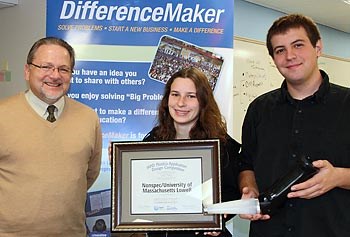DifferenceMakers Win Awards for Innovative Prosthetic Limb

11/21/2013
By Edwin L. Aguirre
A startup company composed of engineering-students-turned-entrepreneurs, called Nonspec, aims to make a difference in the world by fabricating low-cost, durable prosthetic limbs for children in developing countries.
“We have designed and built replacement limbs that are highly functional and can be customized to fit young users,” says Nonspec CEO Jonathan de Alderete, who graduated this year with a bachelor’s degree in mechanical engineering and is now enrolled in the master of science in innovation and technological entrepreneurship program (MSITE).
Other members of the team include plastics engineering graduate student Erin Keaney, mechanical engineering graduate students Katherine Cain and Olivia Keane, co-op student Brendan Donoghue and MBA student Tucker Holladay.
In war-torn regions of the world, the leading causes of loss of limb or amputation are land mines, terrorist bombings, accidents and the lack of basic public health, which often leads to infection and gangrene. Amputees have to deal not only with the loss of physical ability, but the disfigurement can also cause lasting emotional and psychological trauma and loss of dignity.
According to a 2006 report published by the American Academy of Orthotists and Prosthetists, a traditional prosthetic limb made in a developing country can cost up to $1,900 apiece, and children can go through 25 limbs or more in their lives.
“This presents a major problem since the average family income in rural areas is typically around $300 annually,” the report states.
Nonspec’s goal is to mass-produce replacement limbs that anyone can afford — the team estimates the cost per unit of its device to be $20 for 20,000 units. Using an innovative telescoping system of thermoplastic rods, the students designed the limb to be “growable,” or scalable.
“This means children in developing nations need to change their prosthetics fewer times throughout their childhood, allowing them to develop their muscles regularly and, overall, enjoy a more normal, active and hands-on life,” says De Alderete. “Our product can also be adjusted for adult clients as a life-long product.”
A DifferenceMaker Role Model
“From the beginning, the Nonspec team showed dedication and enthusiasm by attending each DifferenceMaker educational workshop and event,” says Assoc. Prof. Steven Tello, associate vice chancellor for entrepreneurship and economic development.
Tello introduced the DifferenceMaker program to campus last year as a way to engage students, faculty and alumni in interdisciplinary activities meant to explore real-life problems, create solutions and make a difference in the community, the region and the world.
In April, Nonspec participated in the first annual DifferenceMaker Idea Challenge, where it received the prestigious title “Campus-wide DifferenceMaker,” along with the top prize of $5,000. The funds allowed the team to create its first batch of prosthetic arms.
“With a projected 15 percent market share in the next five years, our company plans to use this market presence to launch a foundation called ‘Give a Hand,’ ” says Keaney, co-founder and vice president of Nonspec.
Following its success in the Idea Challenge, the team went on to win first-place honors and $1,000 in cash during the International Association of Plastics Distribution’s “Plastics Application Design Competition,” held in October in Miami.
“We beat the team from the Harvard Graduate School of Design by a wide margin,” says De Alderete.
Entrepreneur Magazine has also recognized the team’s mission by selecting it as one of the top 10 semi-finalists in the publication’s “College Entrepreneur of 2013 Contest.”
“Because of Nonspec’s motivation and high entrepreneurial spirits, we used the team as a role model by featuring the students in a YouTube video that was shown at all DifferenceMaker freshman-orientation sessions throughout summer,” says Tello.
Keaney’s advice to prospective DifferenceMakers is to network with other students, groups and professors.
“If you find something that interests you, go for it,” she says. “Show up at meetings because you are going to make new friends and find other interests you didn’t know you had. It’s a really great way to spark your brain in different directions and see what you’re really passionate about.”
Adds Tello: “Everybody has ideas — if you don’t talk to anyone about your idea, it’s not going anywhere.”
To make a tax-deductible contribution to support Nonspec and other University student projects, go to Hawk Hatch at www.uml.edu/hawkhatch.
